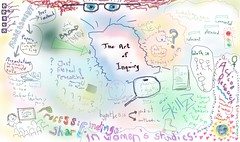 Image by Candace Nast via FlickrIt was really interesting that Jennie Swann started by indicating the synergies and overlaps between the previous 2 sessions and hers, although she is developing communities of inquiry rather than a CoP as CoPs take time to develop, and the course she works on is only 12 weeks in duration.
Image by Candace Nast via FlickrIt was really interesting that Jennie Swann started by indicating the synergies and overlaps between the previous 2 sessions and hers, although she is developing communities of inquiry rather than a CoP as CoPs take time to develop, and the course she works on is only 12 weeks in duration. Jennie started with a 'conceptual artefact' "students never claimed to be digital natives and we spould stop beating them up for not being epxert online learners. Teach them" @easgill. This was the top tweet from the first day at the conference, and Jennie totally agreed with the thrust of the tweet, and used it as a segue into discussing experiences in MOOCs, in particularly the age of participants. The ones who participated effectively were the ones who have the skills. So there is a gap between Prensky's original assertion that the digital native's students' thinking patterns have changed, and the need to work with things that are familiar.
 Image via Wikipedia
Image via WikipediaLearners in tertiary, also, are diverse. Research shows that students are skilled at using LMSs, Google, Wikipedia, emails, and mobile phones. Thye have littel familiarity with collaborative knowledge creation tools, virtual worlds, personal web publishing, and other emergent socail technologies. The students do not appear to have radically differnnt patterns of knowledge creation and sharing (Margaryan, Littlejohn, and Voijt).
It has been asserted that learners can, through social software can easily connetct and share with each other leading to conversations. But what do these conversations look like? And what do you do if they don't? Also, (and oft quited reason for not encoouraging coversations)how does the content get coverered?
Ways of knowing underping forms of intellectual and ethcial development in the college environment. Students often, for example, believe that knowledge is certain and it is the role of the teacher to cram this knowledge into our heads and we'll regurgitate this in our exams. Lecturers often feel the same - and the focus is on lower order thinkoing skills....Jennie wondered if that was because there is no compulsory teacher training in tertiary. Once knowledge is not seen as certain, then people can have different points of view on things...it's OK to disagree and discuss.
Contextual knowledge judged on the basis of evidence in context which promostes the applicaiton of knowledge in context and promotes ecaluative discussion of perspectice. In this discourse, teachers and students often critique each other.Lecturers can also use a range of open questions to help initiate discussions. The Web site (Networked Dialogue) is openly available.
Jennie showed a site that scaffolds students through the process and structure of conversations - it takes them step-by-step., as well as indicating possible issues that might be faced.






No comments:
Post a Comment